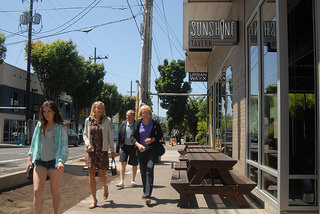Oregon seems to be nearing a series of party-line votes that would remove its statewide ban on inclusionary zoning.
IZ, as it’s sometimes known, is a type of zoning used in many U.S. cities that requires developers in certain areas to offer some housing units at below-market prices, usually to people with middle or low incomes.
House Bill 2564 is scheduled to hit the state House floor today, personally carried by House Speaker Tina Kotek (D-North Portland). After a party-line committee vote last week, a leading backer predicted Monday that the bill will pass the state House on another party-line vote, with every Democrat in favor and every Republican opposed.
“It’s a privilege to be able to build in the city. They benefit from a lot of public investments.”
— Jon Ostar, OPAL Environmental Justice Oregon
Because the bill seems likely to pass with or without moderate Republicans’ votes, said Jon Ostar of OPAL Environmental Justice Oregon, “all they’d be doing is exposing themselves to the homebuilders’ wrath” if they voted against it.
Backers of HB 2564, who include the Bicycle Transportation Alliance among other transportation, urbanism and equity advocates, say it’s a needed tool for preserving income diversity in high-demand neighborhoods like central Portland. Opponents, led by the state’s homebuilders’ association, say private developers shouldn’t bear the costs of keeping neighborhoods income-diverse.
Advertisement
We wrote about inclusionary zoning in 2013, as the coalition was forming to get it through the legislature, and again last winter when advocates gathered to support it in Salem.
“Everyone should have the opportunity, at least, to live in communities where there’s transportation choices, but our current pattern of development hasn’t given us that,” Ostar’s colleague Vivian Satterfield told us in February.

has more income diversity than many fast-growing
areas, but less than its developers pledged.
(Photo: J.Maus/BikePortland)
Ostar said Monday that the bill likely to pass the House today will do so thanks to an amendment brokered by Kotek that would set a maximum of 30 percent below-market units per project, or the equivalent. He said this “went a long way to shoring up some moderate Ds.”
Ostar said his group’s biggest objection to the change is that its language “undercuts the principle that development is a privilege, not a right.”
“We’re trying to shift people’s mindsets away from the idea that developers have a right to build things,” Ostar said. “It’s a privilege to be able to build in the city. They benefit from a lot of public investments.”
If successful, the bill will move to the state Senate.
“I anticipate having some pretty heated battles in the Senate as I think the homebuilders try to make those conditions a lot more specific in terms of delivering benefits to developers,” Ostar predicted.
Update 3 pm: The bill did indeed pass the house, 34-25, on a nearly party-line vote. Brian Clem (D-Salem) voted against the bill.
Correction 6:15 pm: An earlier version of this post omitted Clem’s vote against the bill.



